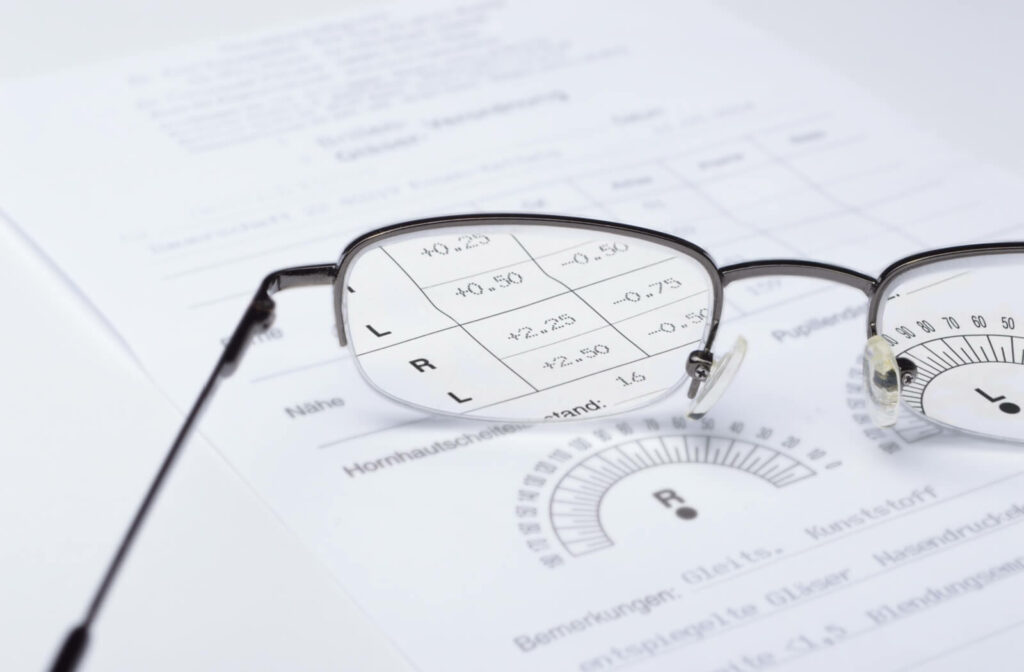Consistent vision care begins at your optometrist’s office. Your comprehensive eye examination covers various important aspects of vision care, including checking if your eye prescription is up to date.
But how often does your eye prescription change, and what can you expect during your eye exam? Let’s take a look.
What to Expect During Your Eye Exam
A comprehensive eye exam allows your optometrist the opportunity to get up close and personal with your eyes and vision health.
During an eye exam, your optometrist will check for refractive errors such as:
- Myopia (nearsightedness)
- Hyperopia (farsightedness)
- Astigmatism
- Presbyopia
An eye exam does more than just check if your prescription is up to date—it can also help monitor and detect early signs of developing eye disease.
Early detection and treatment allow your optometrist to develop a personalized treatment plan that meets your visual needs.
Your eye exam will consist of testing that assesses your overall ocular health using noninvasive high-definition diagnostic imaging to see the details of your retina in detail.
Children’s Eye Exams
Adults aren’t the only ones who need consistent eye exams. Children can get an early jump on developing good vision care habits that they can carry with them for a lifetime.
Early visual development is a crucial time for children, and it contributes to other aspects of their lives, such as reading and academic performance.
Children may not always realize something is wrong with their vision—some signs that their vision is compromised can include:
- Excessive eye rubbing or blinking
- Inability to maintain eye contact
- Headaches or dizziness
- Holding books or devices very close to their face
These signs can indicate something is wrong, but only a comprehensive eye exam with your optometrist can narrow down and pinpoint the causes of your child’s vision issues.
How Often Does Your Eye Prescription Change?
You know the importance of consistent eye exams and the benefits they bring, but you may be wondering how often your prescription changes for contact lenses or glasses.
It’s important to note that contact lens prescriptions and glasses prescriptions differ, and your optometrist will conduct different exams for each purpose. A contact lens exam includes a comprehensive fitting process to ensure your lenses fit comfortably and safely.
Depending on your specific vision condition, your prescription may change every year. However, this varies—it can take more than 2 or 3 years for your prescription to change.
Eye conditions such as keratoconus, which occurs when your cornea thins and gradually bulges outward, forming a cone shape, can result in a more frequently changing prescription.
Vision changes happen naturally, and your eyes change and grow along with your body. Drastic vision changes can signal more serious eye conditions, so it’s essential to report these changes to your optometrist.
Eye Exam Frequency for Adults & Children
Because vision is ever-changing, developing a consistent eye exam schedule is essential, whether it’s for you or your children.
The following eye exam frequency is recommended for adults and seniors:
- 18–39-year-olds should visit at least every 2 years
- 20–64-year-olds should visit at least every 2 years
- 65+-year-olds should visit once every year
Your child’s vision is ever-changing and evolving, so consistent eye exams are essential to monitoring development. The following eye exam frequency is recommended for children:
- First exam at 6 to 12 months of age
- At least 1 exam between 3 and 5 years of age
- 1 exam before first grade and annually from 6 through 17 years of age
Consistent Eye Care
Prescription changes can occur due to various reasons, and consistent eye exams can help your optometrist stay up to date on any dramatic changes in your vision to recommend the best course of action.
Book an appointment with your optometrist to stay on top of prescription changes and preserve your clear vision.



